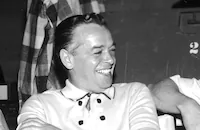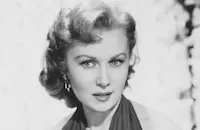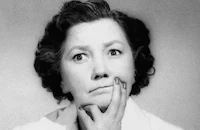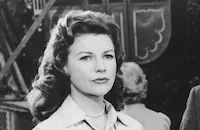The Crowded Sky

Brief Synopsis
Cast & Crew
Joseph Pevney
Dana Andrews
Rhonda Fleming
Efrem Zimbalist Jr.
John Kerr
Anne Francis
Film Details
Technical Specs

Synopsis
At a San Diego military air station, McVey, a young sailor, is scheduled to fly to Washington, D.C., on a jet piloted by Capt. Dale Heath, who was involved in a mid-air collision three years earlier. Meanwhile, at the Heath residence, Dale's philandering wife Cheryl smugly tells Dale that she seduced him to destroy his grounds for divorce, because her lawyer advised that consenting to sex after catching one's partner in flagrante delicto legally implies forgiveness. Wearily, Dale tells Cheryl that he is not planning to renounce his marriage vows and is more concerned about their daughter, Anne, who wants to go to boarding school to get away from her mother. After bribing Cheryl with a new convertible, Dale tells the adoring Anne that she can pick out a school to attend. Later, at the airfield, Dale explains to McVey that they will be flying under Instrument Flight Rules, which, to avoid head-on collisions, dictate that eastbound planes fly at odd-numbered altitudes and westbound, even-numbered, leaving 1,000 feet of airspace between their paths. When McVey asks about his collision, Dale, a Korean War veteran, explains how an off-course B-66 heading toward him momentarily awakened his wartime instincts, causing him to fly evasively upward. Although he was able to eject from his cabin, his survival was at the expense of the other plane, which crashed into his plane's belly and trapped its occupants. In a Washington, D.C. taxi, stewardess Kitty Foster and her boyfriend, pilot Mike Rule, whose passion is painting, are heading to the airport to serve on a Trans States Airline flight to Los Angeles. Kitty asks Mike to marry her, but he is distracted by one of his drawings that has been bought by a cigarette company to use for an ad. At the airport Dick Barnett, who will head the westbound crew, turns down a promotion to a desk job offered by airline executive J. B. After the passengers board, Dick takes off and settles into a flight path at 20,000 feet. Despite tension between them, Mike asks about Dick's son, Dick, Jr., which causes Dick tacitly to reminisce about his child: Although Dick wants the baby named after him, later he and his son never get along, as Dick is a stern father who is quick to criticize and slow to compliment. When his wife Bev dies, his son finds no comfort from Dick's stoic demeanor, and instead cries on family friend Mike's shoulder. Dick's perfectionist attitude further alienates his son, who, as a teenager, is arrested for a prank. In the present, Dick recalls Bev saying that he cannot understand his son, because he never makes mistakes. She explains, "Without mistakes, there is no forgiving, and without forgiving, there is no love." Mike interrupts Dick's reverie to point out that he is flying five hundred feet too high, but Dick, resenting criticism, claims he is flying above the turbulence for the comfort of the passengers and is contemptuous of Mike's argument about "the crowded sky." Flying east, Dale and McVey experience severe weather conditions and discover their radio is out of order, rendering communication with the air traffic control centers impossible. After trying to distract McVey from his anxiety, Dale thinks about his final days at the Naval Academy: Cheryl, a rear admiral's daughter, tricks him into marriage immediately after graduation by falsely claiming she is pregnant. After he refuses to accept preferential treatment by her father and is assigned to a Truth or Consequences, New Mexico, airfield, she begins having affairs. In the present, Dale concedes to himself that, without his unhappy marriage, he would not have Anne. In the westbound plane, Kitty asks Mike about the tension between him and Dick, causing Mike to remember events from the past: At a poker game, Mike's senior officers announce that he is ready to be a captain, but Dick disagrees, saying that Mike cannot be devoted to both flying and painting. Having his promotion officially blocked by Dick, Mike gets drunk and awakens the next day in Kitty's apartment. They have never met before, but she owns one of his paintings and has read about his deceased father Noah, a tormented but famous painter who burned all but four of his creations. Attracted to Kitty, Mike borrows a Cessna and flies her to see Noah's extant works, but warns her that he intends to stay unmarried and without children, so he can pursue his art. Kitty says that she is uninterested in an affair, and later confides that years earlier she bore a child, whom she was forced to give up. While viewing a painting of Noah's that is owned by one of the artist's many former wives, Mike, to his surprise, learns that his father is alive and living in an asylum. After they visit Noah, Kitty says that she has fallen in love with Mike and believes that they may someday marry. When Mike's thoughts return to the present, the plane is almost halfway across the continent. He again insists that Dick fly at the correct altitude, but Dick stubbornly refuses. Dale and McVey land in El Paso to have the radio repaired and then take off again. In the air, the radio again malfunctions, preventing Dale from sending calls, although he can receive them. Because he is unable to ask for an altimeter setting, he cannot ascertain that he is flying too low. Following standard procedure, he continues on course to avoid collision, but, as a signal to the control center, flicks his IFF switch, alerting a quick-thinking controller below who guesses his problem. When the controller radios a warning that Dale appears to have dropped 1,000 feet too low, Dale flies his jet upward. Above them, at Mike's urging, Dick descends, aiming for an altitude of 2,500 feet, unaware that he is on a collision course with Dale's plane. When Dale spots the plane heading toward him, he instantly chooses to sacrifice his plane for theirs and dives. The planes collide and, seconds later, the jet explodes. In the collision, Dick's plane loses one engine and his flight engineer is sucked out of the plane to his death while Kitty and another stewardess assist the frightened and injured passengers. With one wing on fire, Dick skillfully makes an emergency landing, saving most of his crew and passengers, and afterward, at a hearing, claims full responsibility for the crash, which, he explains, was due to his own "pilot error" coinciding with Dale's plane's mechanical failure. After acknowledging his own shortcomings, Dick is able to reunite with Dick, Jr. Later, Mike proposes to Kitty in front of a billboard featuring his painting.

Director

Joseph Pevney
Cast

Dana Andrews

Rhonda Fleming

Efrem Zimbalist Jr.

John Kerr

Anne Francis

Keenan Wynn

Troy Donahue

Joe Mantell

Patsy Kelly
Donald May
Louis Quinn
Edward Kemmer
Tom Gilson
Hollis Irving
Paul Genge

Jean Willes

Frieda Inescourt

Nan Leslie
Mary Patton
Warren Parker
Saundra Edwards
Ken Currie
Karen Green
Rad Fulton
Dave Alpert

Nicky Blair
Martin Smith
Ed Prentiss
Mary Benoit
Theodore Eccles
Jimmy Martin
S. John Launer
Sharon Bell
Diane Park
Roberta May
Tammy Brindle
Ricci Rondell
Dayton Osmond
Robert Burgess
Bruce Blau
Jane Crowley
Scott Elliott
Chet Stratton
Brandon Beach
John Alonzo
Bernard Pludow
Bob Harris
Don Grady
Douglas Grange
William Masters
William Bliss
John Garrett
Crew
Gordon Bau
George Bennett
Hoyt Bowers
Rose Brandi
Donald Brink
Leon Charles
William Classen
Al Francis
Michael Garrison
Gilbert Germaine
John Hanley
Chuck Hansen
Lon Hopper
Ora Hudson
Eddie Imazu
Horace Jones
William L. Kuehl
Al Mackenzie
Paul Mantz
Tom Mcadoo
Floyd Mccarty
M. A. Merrick
John Noble
Charles Oelze
Allen Pomeroy
Leonard Rosenman
Bernt Sad
Charles Schnee
Dorothy Shaw
Howard Shoup
Milt Stein
Harry Stradling Sr.
Jim Thompson
Robert Turner
Marshall Wolins
Ted Young

Film Details
Technical Specs

Articles
The Crowded Sky
The title comes from the increasing problem in air travel following World War II when the growing civilian transportation industry put bigger and faster planes into the air. To prevent more accidents as depicted in The Crowded Sky, new systems were put into place, such as the Instrument Flight Rules explained by one of the pilot characters in the film. Air traffic control centers were originally located only at certain airfields around the country, but in the 1950s they were expanded to meet the need. The film dramatizes the process by which controllers used to monitor pilots via low frequency radio transmissions susceptible to location, weather, mechanical problems and other factors, resulting in the situation around which the plot hinges. It also depicts how, despite the best advice of the people on the ground, pilots were in charge of their own flights, bringing the human error factor into the mix.
The Crowded Sky, however, was no mere dramatization of the realities of cross-continental flight at the time. Like the best disaster films, this one is packed with backstories for even most of the minor characters, some of whom don't make it out alive to resolve the issues they boarded with while others, of course, emerge intact with the "Great Revelations" that change their lives. One such subplot involves then teen idol Troy Donahue as a character who has to choose between marriage to a Miss America contestant and attending a prestigious Naval Academy (the kind of choice we all face everyday). During a scene in which Donahue talks about his girlfriend, the filmmakers even threw in a little in-joke - playing in the background, you can hear the theme song from Donahue's box office hit A Summer Place (1959).
Despite some formulaic and clichéd aspects, The Crowded Sky received some favorable reviews and some less gracious ones as well. Variety complained that "lost in the general preoccupation with multi-exposition is an all-important philosophical point-of-view...Additional defects are Joseph Pevney's patronizing directorial touches (zooming in on individual players for intimate personal observations that are at once obvious to the audience ) and a good deal of artificially hip dialogue." On the positive side, the reviewer noted "There is, however, a certain wallop at the point of aerial impact that is likely to keep an audience vicariously spellbound as props are feathered, switches are pulled, passengers are buffeted about and airports are soaked down with suds."
Director Joseph Pevney's feature film career didn't necessarily benefit from this production. He made only two more theatrical releases before moving into a successful two decade run of directing television shows that included many episodes of Star Trek, Bonanza, The Paper Chase, and others.
The film was shot by famed cinematographer Harry Stradling, Sr., a 14-time Academy Award® nominee and winner for The Picture of Dorian Gray (1945) and My Fair Lady (1964). Stradling also shot Hitchcock's Suspicion (1941), A Streetcar Named Desire (1951), Johnny Guitar (1954), several MGM big-budget musicals, and the aforementioned A Summer Place.
The Crowded Sky also shares one other significant element with one of its descendants in the disaster genre. In this film, Efrem Zimbalist, Jr.'s military jet crashes into the commercial airliner piloted by Dana Andrews. In Airport 75 (1974), Andrews got even by crashing his private plane into Zimbalist's commercial jet. Is it any wonder, then, that the disaster flick was so ripe for parody by the time of Airplane! (1980)?
Producer: Michael Garrison
Director: Joseph Pevney
Screenplay: Charles Schnee; Hank Searls (novel)
Cinematography: Harry Stradling, Sr.
Art Direction: Eddie Imazu
Music: Leonard Rosenman
Film Editing: Tom McAdoo
Cast: Dana Andrews (Dick Barnett), Rhonda Fleming (Cheryl 'Charro' Heath), Efrem Zimbalist, Jr. (Dale Heath), John Kerr (Mike Rule), Anne Francis (Kitty Foster), Keenan Wynn (Nick Hyland), Troy Donahue (McVey), Joe Mantell (Louis Capelli), Patsy Kelly (Gertrude Ross), Donald May (Norm Coster), Louis Quinn (Sidney Schreiber), Edward Kemmer (Caesar), Tom Gilson (Robert 'Rob' Fermi), Hollis Irving (Beatrice Wiley), Paul Genge (Samuel N. Poole), Jean Willes (Gloria Panawek), Frieda Inescort (Mrs. Mitchell), Nan Leslie (Bev).
C-105m. Closed Captioning.
by Rob Nixon

The Crowded Sky
Quotes
Trivia
While 'Efrem Zimbalist, Jr.' and Troy Donahue are talking in the airport coffee shop, the music playing in the background is "Theme from Summer Place, A (1959)", a movie in which Donahue starred in 1959.
Notes
Although their appearance in the film has not been confirmed, October and November 1959 news items add Shecky Greene, Charles Laitlaw, Floyd Cartridge and Rose Bright to the cast. According to a November 1959 Hollywood Reporter news item, Mary Patton and Warren Parker, who portrayed "Dr. Ed and Pat Benedict," were married in real life. Although a November 1959 Hollywood Reporter news item erroneously reported that Ken Curtis had been added to the cast, the news item was possibly intended to announce the casting of Ken Currie, who played "Dick Barnett, Jr." Curtis was not in the film.
After World War II, when the sky became increasingly "crowded" with faster jets and a growing civilian transportation industry, mid-air collisions were a natural consequence of crafts moving in various directions and speeds. To prevent more tragedies and to modernize the airways, systems such as the Instrument Flight Rules explained by the character "Dale Heath" early in the film, were developed. Air traffic control centers (ATCs), which were initially located only at certain airfields, were set up across the country to monitor flights and provide feedback to the pilots and, during the 1950s, the stressful occupation of the air traffic controller evolved. Flight data was communicated to air traffic control centers by Teletype and then handwritten onto "flight progress strips" by the controllers. As shown briefly in the film, the strips were placed into metal racks representing a horizontal segment of airspace, and positioned to show the plane's altitude within 1,000-feet designations. As the plane progressed, the strips were passed by hand to the next rack.
As dramatized in the film, controllers advised pilots via low frequency radio transmissions, which were highly vulnerable to location, weather, mechanical problems and other factors and, as seen in the film, the pilot "tuned in" to various frequencies on his radio by turning a dial. By the late 1950s, controllers could also monitor flights on radarscopes, which showed crafts as indiscriminating blips, but they still had to determine which blip represented what plane and confirm the altitude of the plane with the pilot. More than any tool, each air traffic controller depended on his own ability mentally to keep track of frequently changing data. Despite the inadequacies of their systems, the controllers could see a broader perspective of the air traffic than the pilots, but the pilots were in charge of their flights. As demonstrated in the film, safety often depended on the pilot's willingness to adhere to the rules and the advice of the controllers.
The film's generally favorable Hollywood Reporter review noted the "various vignettes of life seen in present and in flashback." Besides the main story line of the crash between a military jet and a propeller powered commercial airplane, The Crowded Sky contains several melodramatic subplots, not included in the summary above, involving the passengers and crew on the two planes, among them: An unconfident man and a homely woman too shy to speak to each other are united by the shared experience of the collision; a New York Method actor on his way to a Hollywood audition worries that he cannot "handle the inner life" of a cowardly character, until he experiences the fear of death first hand; a doctor's wife dies in the crash, unaware of her terminal heart condition; a womanizing television scriptwriter does not realize that his married seatmate is a former paramour; a controller leaves his work shift understaffed when his wife goes into labor; a comical flight engineer jokes that his wife is a "monster" to hide the depth of his love for her; and the character "McVey" feels compelled to choose between marriage with a Miss America contestant and attending the prestigious Naval Academy. During a scene in which McVey, played by Troy Donahue, talks about his girlfriend, the soundtrack plays the theme from A Summer Place, the 1959 Warner Bros. film in which Donahue starred (see below).
The film's use of flashbacks and voice-overs to reveal characters' dilemmas and backstories was described by the dissatisfied Variety reviewer as a "vapor trail of disjointed flashbacks." The Variety reviewer also called The Crowded Sky "a kind of jet-propelled variation on the studio's 1954 aerial excursion, The High and the Mighty" , a film which also interwove multiple character subplots into the main "disaster" theme of the story and which was parodied in later films, such as the 1980 Paramount comedy Airplane.
About The Crowded Sky, the Variety review quipped "this latter day altitudinous rumpus is likely to establish Warner Bros. Airlines as 'the only way to fly.'" Actors Dana Andrews and Efrem Zimbalist, Jr., who portrayed "Dick Barnett" and "Dale Heath," respectively, crashed their fictional planes in mid-air a second time in the 1974 Universal production, Airport 1975, in which they again appeared as pilots, but not the same characters they portrayed in The Crowded Sky.

Miscellaneous Notes
Released in United States 1960
Released in United States 1960













